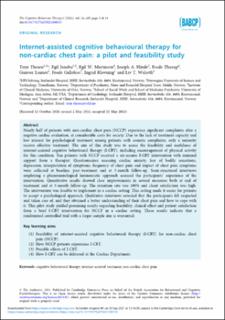| dc.contributor.author | Thesen, Terje | |
| dc.contributor.author | Jonsbu, Egil | |
| dc.contributor.author | Martinsen, Egil Wilhelm | |
| dc.contributor.author | Himle, Joseph A. | |
| dc.contributor.author | Thorup, Frode | |
| dc.contributor.author | Launes, Gunvor | |
| dc.contributor.author | Gallefoss, Frode | |
| dc.contributor.author | Klovning, Ingrid | |
| dc.contributor.author | Walseth, Liv Tveit | |
| dc.date.accessioned | 2021-10-01T06:24:33Z | |
| dc.date.available | 2021-10-01T06:24:33Z | |
| dc.date.created | 2021-09-30T15:14:34Z | |
| dc.date.issued | 2021 | |
| dc.identifier.citation | The Cognitive Behaviour Therapist. 2021, 14 (e19), . | en_US |
| dc.identifier.issn | 1754-470X | |
| dc.identifier.uri | https://hdl.handle.net/11250/2786837 | |
| dc.description.abstract | Nearly half of patients with non-cardiac chest pain (NCCP) experience significant complaints after a negative cardiac evaluation, at considerable costs for society. Due to the lack of treatment capacity and low interest for psychological treatment among patients with somatic complaints, only a minority receive effective treatment. The aim of this study was to assess the feasibility and usefulness of internet-assisted cognitive behavioural therapy (I-CBT), including encouragement of physical activity for this condition. Ten patients with NCCP received a six-session I-CBT intervention with minimal support from a therapist. Questionnaires assessing cardiac anxiety, fear of bodily sensations, depression, interpretation of symptoms, frequency of chest pain and impact of chest pain symptoms were collected at baseline, post-treatment and at 3-month follow-up. Semi-structured interviews employing a phenomenological hermeneutic approach assessed the participants’ experience of the intervention. Quantitative results showed clear improvements in several measures both at end of treatment and at 3-month follow-up. The retention rate was 100% and client satisfaction was high. The intervention was feasible to implement in a cardiac setting. This setting made it easier for patients to accept a psychological approach. Qualitative interviews revealed that the participants felt respected and taken care of, and they obtained a better understanding of their chest pain and how to cope with it. This pilot study yielded promising results regarding feasibility, clinical effect and patient satisfaction from a brief I-CBT intervention for NCCP in a cardiac setting. These results indicate that a randomized controlled trial with a larger sample size is warranted. | en_US |
| dc.language.iso | eng | en_US |
| dc.publisher | Cambridge University Press | en_US |
| dc.rights | Navngivelse 4.0 Internasjonal | * |
| dc.rights.uri | http://creativecommons.org/licenses/by/4.0/deed.no | * |
| dc.title | Internet-assisted cognitive behavioural therapy for non-cardiac chest pain: a pilot and feasibility study | en_US |
| dc.type | Peer reviewed | en_US |
| dc.type | Journal article | en_US |
| dc.description.version | publishedVersion | en_US |
| dc.source.pagenumber | 18 | en_US |
| dc.source.volume | 14 | en_US |
| dc.source.journal | The Cognitive Behaviour Therapist | en_US |
| dc.source.issue | e19 | en_US |
| dc.identifier.doi | 10.1017/S1754470X21000155 | |
| dc.identifier.cristin | 1941557 | |
| cristin.ispublished | true | |
| cristin.fulltext | original | |
| cristin.qualitycode | 1 | |

